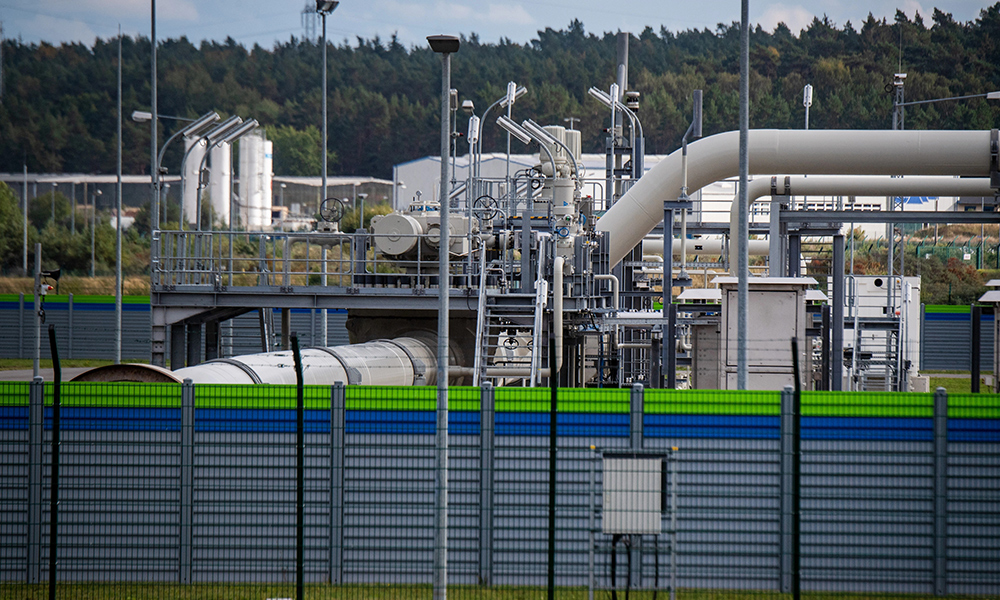
嚴(yán)冬之中,家庭取暖和商業(yè)用電的成本顯著增長(zhǎng),數(shù)百萬(wàn)歐美人士因此哀嘆不已,但他們應(yīng)該為明年冬天更糟糕的情況做好準(zhǔn)備。
經(jīng)合組織(Organization of Economic Cooperation and Development)的首席經(jīng)濟(jì)學(xué)家阿爾瓦羅·桑托斯·佩雷拉說(shuō):“在歐洲,如果今年出現(xiàn)寒冬,情況就會(huì)變得復(fù)雜。但我們更擔(dān)心明年。特別是在天然氣市場(chǎng),因?yàn)榇娑砹_斯天然氣將成為一項(xiàng)挑戰(zhàn)。”
佩雷拉曾經(jīng)擔(dān)任葡萄牙的經(jīng)濟(jì)部部長(zhǎng)。11月21日,他在法國(guó)巴黎對(duì)英美新聞協(xié)會(huì)(Anglo-American Press Association)的一小批記者做出上述表態(tài)。次日,總部設(shè)在巴黎的經(jīng)合組織發(fā)布了它最重要的世界經(jīng)濟(jì)展望(World Economic Outlook)報(bào)告。該組織追蹤約48個(gè)國(guó)家的數(shù)據(jù),并估算全球幾個(gè)最大經(jīng)濟(jì)體的增長(zhǎng)率。這份報(bào)告考察了各個(gè)國(guó)家每年的表現(xiàn),并對(duì)隨后兩年的前景做出了預(yù)測(cè)。
今年的預(yù)期令人警醒。佩雷拉表示,2022年全球經(jīng)濟(jì)將增長(zhǎng)3.1%左右。考慮到2月24日俄烏沖突爆發(fā)以來(lái)波及整個(gè)世界的嚴(yán)重能源危機(jī)以及此前俄羅斯一直是全球主要能源供應(yīng)國(guó),這樣的預(yù)期顯得較為樂(lè)觀。
但佩雷拉指出,到2023年才能看清全球經(jīng)濟(jì)面臨的問(wèn)題到底有多大。經(jīng)合組織預(yù)測(cè)2023年全球經(jīng)濟(jì)增速將“大幅下降”至2.2%,“2024年稍稍反彈”至2.7%左右。
對(duì)美國(guó)來(lái)說(shuō),經(jīng)合組織的預(yù)測(cè)甚至更糟。
明年美國(guó)經(jīng)濟(jì)增速僅為0.5%
經(jīng)合組織預(yù)測(cè),今年美國(guó)經(jīng)濟(jì)將增長(zhǎng)1.8%,而明年增速僅為0.5%,2024年略有回升,達(dá)到1%。美國(guó)的能源出口量大于進(jìn)口量,其中包括向歐洲出口的液化天然氣,美國(guó)的目的是取代一部分俄羅斯能源,而這在一定程度上屏蔽了持續(xù)九個(gè)月的俄烏沖突帶來(lái)的經(jīng)濟(jì)沖擊。盡管如此,美國(guó)人仍然面臨著高通脹和不斷走弱的房地產(chǎn)市場(chǎng),企業(yè)也仍然面對(duì)著供給緊張的勞動(dòng)力市場(chǎng)和持續(xù)上升的薪資。經(jīng)合組織的報(bào)告稱:“和新冠疫情前相比,國(guó)內(nèi)食品和汽油價(jià)格仍然居高不下,這主要是俄烏沖突所致。”
佩雷拉表示,最受傷的也許是俄羅斯自己,因?yàn)槎砹_斯將出現(xiàn)“重大衰退,不僅是今年,明年和后年同樣如此。很難想象我們?cè)鯓硬拍芑氐蕉頌鯖_突之前的那個(gè)世界,或者那個(gè)能源世界。”
但預(yù)測(cè)的作用僅此而已。2021年12月,經(jīng)合組織在225頁(yè)的展望報(bào)告中對(duì)烏克蘭只字未提。過(guò)了不到兩個(gè)月,俄羅斯對(duì)烏克蘭的特別軍事行動(dòng)就撼動(dòng)了全球經(jīng)濟(jì)。
現(xiàn)在,全球各個(gè)經(jīng)濟(jì)體都受到了俄烏沖突的影響。佩雷拉稱,這是自20世紀(jì)70年代以來(lái)最嚴(yán)重的能源危機(jī)。但冬季降臨后,這場(chǎng)危機(jī)對(duì)歐洲的影響一直未能全面展現(xiàn),部分原因是10月和11月的氣溫異常偏高,以及歐盟(European Union)27國(guó)中某些國(guó)家的政府選擇對(duì)冬季家用能源限價(jià)。在一些國(guó)家,天然氣批發(fā)價(jià)目前已經(jīng)高于零售價(jià)。部分歐盟國(guó)家還停止向巴基斯坦等國(guó)出口天然氣,轉(zhuǎn)而選擇充實(shí)自己的儲(chǔ)氣設(shè)施。在歐盟的某些地區(qū),儲(chǔ)氣設(shè)施充盈率已經(jīng)達(dá)到95%左右。
歐洲仍然需要俄羅斯天然氣
但佩雷拉警告,到明年夏天,歐洲將面臨一系列問(wèn)題。
屆時(shí),歐洲儲(chǔ)備的天然氣或已耗盡,而俄羅斯天然氣將不再向歐洲輸送。到目前為止,俄羅斯天然氣船仍然在駛往歐洲港口,但為了報(bào)復(fù)西方對(duì)俄羅斯總統(tǒng)弗拉基米爾·普京的制裁,俄羅斯已經(jīng)切斷了管道天然氣供應(yīng)。
對(duì)烏克蘭采取特別軍事行動(dòng)前,歐洲十分依賴俄羅斯的能源供應(yīng),約有40%的天然氣來(lái)自俄羅斯。雖然群情激奮,但歐洲不愿意制裁俄羅斯天然氣,對(duì)歐天然氣供應(yīng)的急劇減少都是普京的選擇,而非歐洲。
法國(guó)的能源專家蒂埃里·布羅斯在英美新聞協(xié)會(huì)于本月早些時(shí)候召開(kāi)的簡(jiǎn)報(bào)會(huì)上表示:“我們沒(méi)有禁運(yùn)俄羅斯天然氣,因?yàn)槲覀儾荒苓@樣做。”他說(shuō)歐洲天然氣消費(fèi)量中來(lái)自俄羅斯的“最低”要占約7%。
至少到目前為止,中國(guó)的經(jīng)濟(jì)滑坡和新冠疫情防控對(duì)歐洲還有幫助,原因是這讓中國(guó)的能源消費(fèi)量遠(yuǎn)低于新冠疫情前的水平。佩雷拉說(shuō):“歐洲不必和中國(guó)爭(zhēng)奪天然氣。”但按照經(jīng)合組織的報(bào)告,明年亞洲將為全球經(jīng)濟(jì)增長(zhǎng)做出最大貢獻(xiàn),屆時(shí)情況可能會(huì)出現(xiàn)改變。佩雷拉指出:“中國(guó)經(jīng)濟(jì)復(fù)蘇就意味著液化天然氣(LNG)需求增多。那么中國(guó)要從哪里獲得液化天然氣呢?明年將會(huì)出現(xiàn)挑戰(zhàn)。”(財(cái)富中文網(wǎng))
譯者:Charlie
嚴(yán)冬之中,家庭取暖和商業(yè)用電的成本顯著增長(zhǎng),數(shù)百萬(wàn)歐美人士因此哀嘆不已,但他們應(yīng)該為明年冬天更糟糕的情況做好準(zhǔn)備。
經(jīng)合組織(Organization of Economic Cooperation and Development)的首席經(jīng)濟(jì)學(xué)家阿爾瓦羅·桑托斯·佩雷拉說(shuō):“在歐洲,如果今年出現(xiàn)寒冬,情況就會(huì)變得復(fù)雜。但我們更擔(dān)心明年。特別是在天然氣市場(chǎng),因?yàn)榇娑砹_斯天然氣將成為一項(xiàng)挑戰(zhàn)。”
佩雷拉曾經(jīng)擔(dān)任葡萄牙的經(jīng)濟(jì)部部長(zhǎng)。11月21日,他在法國(guó)巴黎對(duì)英美新聞協(xié)會(huì)(Anglo-American Press Association)的一小批記者做出上述表態(tài)。次日,總部設(shè)在巴黎的經(jīng)合組織發(fā)布了它最重要的世界經(jīng)濟(jì)展望(World Economic Outlook)報(bào)告。該組織追蹤約48個(gè)國(guó)家的數(shù)據(jù),并估算全球幾個(gè)最大經(jīng)濟(jì)體的增長(zhǎng)率。這份報(bào)告考察了各個(gè)國(guó)家每年的表現(xiàn),并對(duì)隨后兩年的前景做出了預(yù)測(cè)。
今年的預(yù)期令人警醒。佩雷拉表示,2022年全球經(jīng)濟(jì)將增長(zhǎng)3.1%左右。考慮到2月24日俄烏沖突爆發(fā)以來(lái)波及整個(gè)世界的嚴(yán)重能源危機(jī)以及此前俄羅斯一直是全球主要能源供應(yīng)國(guó),這樣的預(yù)期顯得較為樂(lè)觀。
但佩雷拉指出,到2023年才能看清全球經(jīng)濟(jì)面臨的問(wèn)題到底有多大。經(jīng)合組織預(yù)測(cè)2023年全球經(jīng)濟(jì)增速將“大幅下降”至2.2%,“2024年稍稍反彈”至2.7%左右。
對(duì)美國(guó)來(lái)說(shuō),經(jīng)合組織的預(yù)測(cè)甚至更糟。
明年美國(guó)經(jīng)濟(jì)增速僅為0.5%
經(jīng)合組織預(yù)測(cè),今年美國(guó)經(jīng)濟(jì)將增長(zhǎng)1.8%,而明年增速僅為0.5%,2024年略有回升,達(dá)到1%。美國(guó)的能源出口量大于進(jìn)口量,其中包括向歐洲出口的液化天然氣,美國(guó)的目的是取代一部分俄羅斯能源,而這在一定程度上屏蔽了持續(xù)九個(gè)月的俄烏沖突帶來(lái)的經(jīng)濟(jì)沖擊。盡管如此,美國(guó)人仍然面臨著高通脹和不斷走弱的房地產(chǎn)市場(chǎng),企業(yè)也仍然面對(duì)著供給緊張的勞動(dòng)力市場(chǎng)和持續(xù)上升的薪資。經(jīng)合組織的報(bào)告稱:“和新冠疫情前相比,國(guó)內(nèi)食品和汽油價(jià)格仍然居高不下,這主要是俄烏沖突所致。”
佩雷拉表示,最受傷的也許是俄羅斯自己,因?yàn)槎砹_斯將出現(xiàn)“重大衰退,不僅是今年,明年和后年同樣如此。很難想象我們?cè)鯓硬拍芑氐蕉頌鯖_突之前的那個(gè)世界,或者那個(gè)能源世界。”
但預(yù)測(cè)的作用僅此而已。2021年12月,經(jīng)合組織在225頁(yè)的展望報(bào)告中對(duì)烏克蘭只字未提。過(guò)了不到兩個(gè)月,俄羅斯對(duì)烏克蘭的特別軍事行動(dòng)就撼動(dòng)了全球經(jīng)濟(jì)。
現(xiàn)在,全球各個(gè)經(jīng)濟(jì)體都受到了俄烏沖突的影響。佩雷拉稱,這是自20世紀(jì)70年代以來(lái)最嚴(yán)重的能源危機(jī)。但冬季降臨后,這場(chǎng)危機(jī)對(duì)歐洲的影響一直未能全面展現(xiàn),部分原因是10月和11月的氣溫異常偏高,以及歐盟(European Union)27國(guó)中某些國(guó)家的政府選擇對(duì)冬季家用能源限價(jià)。在一些國(guó)家,天然氣批發(fā)價(jià)目前已經(jīng)高于零售價(jià)。部分歐盟國(guó)家還停止向巴基斯坦等國(guó)出口天然氣,轉(zhuǎn)而選擇充實(shí)自己的儲(chǔ)氣設(shè)施。在歐盟的某些地區(qū),儲(chǔ)氣設(shè)施充盈率已經(jīng)達(dá)到95%左右。
歐洲仍然需要俄羅斯天然氣
但佩雷拉警告,到明年夏天,歐洲將面臨一系列問(wèn)題。
屆時(shí),歐洲儲(chǔ)備的天然氣或已耗盡,而俄羅斯天然氣將不再向歐洲輸送。到目前為止,俄羅斯天然氣船仍然在駛往歐洲港口,但為了報(bào)復(fù)西方對(duì)俄羅斯總統(tǒng)弗拉基米爾·普京的制裁,俄羅斯已經(jīng)切斷了管道天然氣供應(yīng)。
對(duì)烏克蘭采取特別軍事行動(dòng)前,歐洲十分依賴俄羅斯的能源供應(yīng),約有40%的天然氣來(lái)自俄羅斯。雖然群情激奮,但歐洲不愿意制裁俄羅斯天然氣,對(duì)歐天然氣供應(yīng)的急劇減少都是普京的選擇,而非歐洲。
法國(guó)的能源專家蒂埃里·布羅斯在英美新聞協(xié)會(huì)于本月早些時(shí)候召開(kāi)的簡(jiǎn)報(bào)會(huì)上表示:“我們沒(méi)有禁運(yùn)俄羅斯天然氣,因?yàn)槲覀儾荒苓@樣做。”他說(shuō)歐洲天然氣消費(fèi)量中來(lái)自俄羅斯的“最低”要占約7%。
至少到目前為止,中國(guó)的經(jīng)濟(jì)滑坡和新冠疫情防控對(duì)歐洲還有幫助,原因是這讓中國(guó)的能源消費(fèi)量遠(yuǎn)低于新冠疫情前的水平。佩雷拉說(shuō):“歐洲不必和中國(guó)爭(zhēng)奪天然氣。”但按照經(jīng)合組織的報(bào)告,明年亞洲將為全球經(jīng)濟(jì)增長(zhǎng)做出最大貢獻(xiàn),屆時(shí)情況可能會(huì)出現(xiàn)改變。佩雷拉指出:“中國(guó)經(jīng)濟(jì)復(fù)蘇就意味著液化天然氣(LNG)需求增多。那么中國(guó)要從哪里獲得液化天然氣呢?明年將會(huì)出現(xiàn)挑戰(zhàn)。”(財(cái)富中文網(wǎng))
譯者:Charlie
With millions of Americans and Europeans bemoaning the huge rise in cost to heat their homes and power their businesses during the bitter cold months, they ought to brace themselves for even worse times ahead—next winter.
“In Europe, if it is a cold winter this year, it will be complicated. But we are more concerned about next year,” says álvaro Santos Pereira, chief economist for the Organization of Economic Cooperation and Development. “Especially in the gas markets, replacing the Russian gas is going to be a challenge.”
Pereira, a former economy minister of Portugal, was speaking to a small group of journalists from the Anglo-American Press Association in Paris, in advance of today’s release of the OECD’s World Economic Outlook, its flagship report. The Paris-based intergovernmental organization tracks data across about 48 countries, estimating growth for the world’s biggest economies; the report takes stock of countries’ performance levels each year, and forecasts their prospects for the following two years.
This year’s predictions are sobering. Pereira says global growth in 2022 will rise by about 3.1%—a relatively optimistic outlook, given the severe energy crisis that has hit the world since Feb. 24, when Ukraine was invaded by Russia—a global energy powerhouse until then.
But Pereira says that the true scale of the world’s economic woes will only become clear in 2023, when the OECD predicts “a significant slowdown” for the global economy to 2.2%, and then a “l(fā)ittle bit of a rebound in 2024” to about 2.7%.
For Americans, the prediction is even worse.
U.S. growth just 0.5% next year
The organization estimates the U.S. economy will grow by 1.8% this year, and just 0.5% next year, before recovering slightly in 2024 to 1% growth. Since the U.S. exports more energy than it imports—including liquified natural gas (LNG) to Europe, to replace some of Russia’s supplies—the country has been shielded from the full economic impact of the nine-month Ukraine war. Even so, Americans face high inflation and a weakening housing market, and companies still face a tight labor market and rising wages. “Largely as a result of the war, domestic food and gasoline prices remain elevated compared with the pre-pandemic period,” the report says.
Perhaps the greatest pain might be felt by Russia itself, which will face “a massive recession, not only this year, but next year and the following,” Pereira said. “It is difficult to see how we go back to the world, or the energy world, that existed before the war.”
But predictions only go so far. In the OECD’s 225-page outlook report in December, 2021,?there was not a single reference to Ukraine, where Russia’s invasion would rock the global economy less than two months later.
Now, across the world, economies are reeling from the effects of the Ukraine war, with an energy crisis that Pereira says is the most severe since the 1970s. Yet as winter bears down on Europe, the full scale of the crisis has been masked for now, thanks in part to unusually warm weather in October and November, and the fact that several governments in the 27-country European Union have opted to cap households’ energy prices for the winter. In some countries, wholesale gas prices are now higher than retail prices. Some EU countries have also halted gas exports to countries like Pakistan, choosing instead to fill up their own storage tanks. In parts of the EU, tanks are about 95% full.
Europe still needs Russian gas
But Pereira warns that by next summer, Europe will face a raft of problems.
By then, it might have emptied its storage tanks, and Russian gas will no longer flow to the continent; until now, Russian gas tankers have continued to sail to European ports, but the country has cut its piped gas, in retaliation for Western sanctions against Vladimir Putin.
Before Putin invaded Ukraine, the EU was heavily dependent on Russia’s energy supplies, with about 40% of its natural gas coming from the country. Despite widespread outrage, it stopped short of sanctioning Russian gas, and the sharp drop in supplies to Europe has been the choice of Putin, not Europe.
“We did not put an embargo on Russian gas, because we cannot do this,” French energy consultant Thierry Bros told a briefing earlier this month with the Anglo-American Press Association. He says Europeans need “the minimum amount” of about 7% of its gas consumption coming from Russia.
At least until now, Europe has also been helped by China’s economic downturn and its long lockdowns, which have led to far lower energy consumption than before the pandemic. “Europe did not have to compete for gas with China,” Pereira says. That could change next year, when Asia will provide most of the world’s economic growth, according to the OECD’s report. “If China recovers, it will mean more demand for LNG. Where will they get it?” he says. “Next year is going to be a challenge.”






